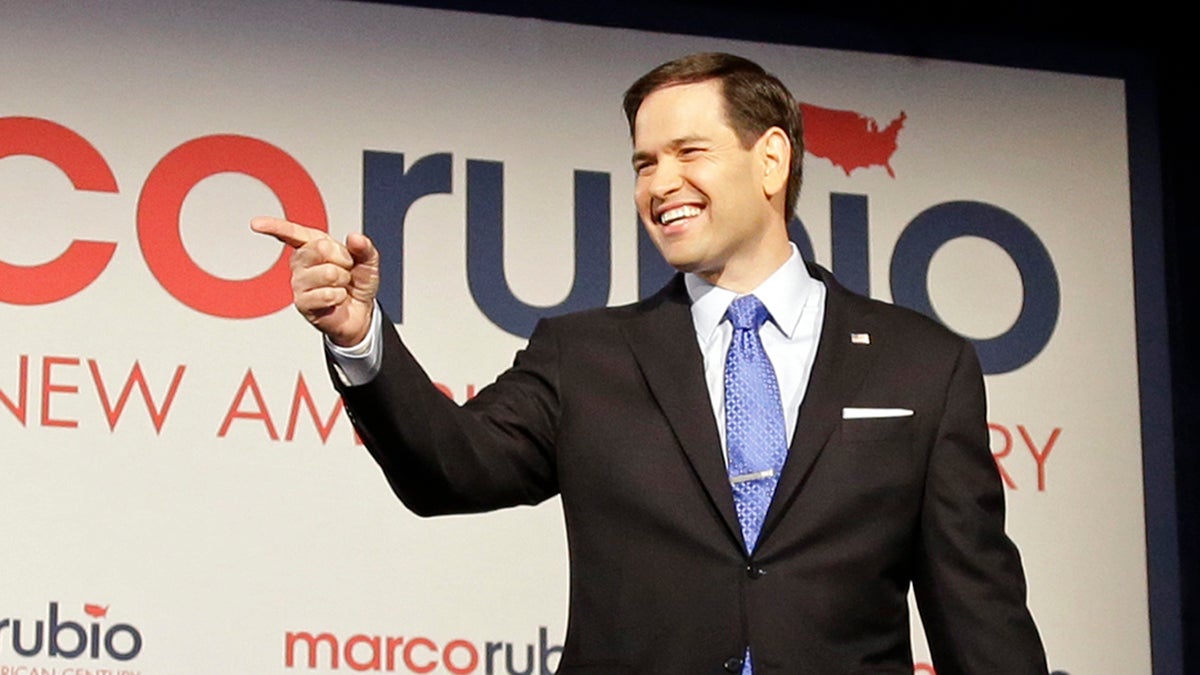Secret money mystery: Who are Marco Rubio’s puppeteers?

Florida Sen. Marco Rubio at a rally in Miami in April. (Alan Diaz/AP Photo)
Who’s pulling Marco Rubio’s strings? We don’t know. And under the rules (such as they are), we aren’t supposed to know.
This has to be one of the sleaziest factoids of the ’16 campaign: Rubio is being ballyhooed in TV ads that are blitzing the airwaves in early primary states — Iowa, New Hampshire, and South Carolina — but his campaign hasn’t paid a penny for TV. The actual sponsor, for all the pro-Rubio ads and a slew of pro-Rubio mailings, is something called the Conservative Solutions Project, a group that has already spent $8 million to boost the boy wonder … without disclosing its donors.
Every TV ad, paid for with dark money. We’ve never seen this level of beneficence before.
What a great deal for Rubio’s secret backers! They pay for his ads, and we have no idea who they are or what they want in return. And it’s totally legal. Backstage bribery is arguably the biggest scandal of the ’16 campaign, and it goes on every day. For this, we can thank the U.S. Supreme Court’s Citizens United ruling (which freed wealthy donors and corporations to give as much as they want, under the principle that the more money you have, the more speech you can buy); a tax code that’s riddled with loopholes; and toothless federal enforcement.
When the high court announced its Citizens ruling five years ago, it promised that we’d at least know who was writing all the checks. The Republican majority said there would be “adequate disclosure. With the advent of the Internet, prompt disclosure of expenditures provide shareholders and citizens with the information needed to hold corporations and elected officials accountable … and see whether elected officials are in the pocket of so-called moneyed interests.”
Yes, the plethora of super PACs — which aid their favorite candidates, without coordinating with the candidates’ campaigns — are indeed required to disclose their donors. But there’s a whole other category, reserved for so-called nonprofit groups. Under the IRS tax code, you can organize as a 501 (c) 4 “social welfare” group, and officially pledge not to spend most of your money on politics. The beauty of this arrangement is that, in practice, you can spend most of your money on politics, because the supposedly fearful IRS rarely polices those pledges. And under the IRS rules, “social welfare” groups are not required to name their donors.
“Social welfare” nonprofits had been around for years, but few political operatives bothered to exploit that option until the high court opened the money spigot. The operatives basically told their big donors, “If you want to remain anonymous, no problem. We’re creating a nonprofit and we can park your money there.”
The results speak for themselves. Only $5 million in secret money was pumped into the 2006 congressional midterm races; in 2014, it was $174 million. That’s an increase of 3480 percent. Roughly $163 million in secret money was routed to the 2008 presidential campaign; that figure doubled in the 2012 campaign, and there’s no telling what the ’16 tally will be.
The pro-Rubio “social welfare” group is a classic of the genre. Under the rarely enforced IRS rules, a nonprofit is required to “operate primarily to further the common good and general welfare of the people of the community.” What a joke. The Conservative Solutions Project was established solely to further the common good and general welfare of Marco Rubio. It’s run by a guy who advised Rubio’s 2010 Senate campaign — with the help of a South Carolina Republican operative who’s a former business partner of Rubio’s campaign manager.
Rubio’s hasn’t raised much money for his official campaign; over the summer, he posted a tepid $6 million. But hey, no problem — because thus far his secret fans have ponied up $18 million for the “social welfare” group. As mentioned, they’re picking up his advertising tab, and they’ve reportedly booked at least $2 million in additional satellite TV time through mid-February. No other presidential candidate has ever leaned on secret donors to this extent.
Rubio was asked about secret money, at a campaign stop in September. His response: “I have always supported disclosure. And I think that as long as people know who is giving you money and why it is, people can make judgments on why you are doing what you’re doing.”
But here’s the hitch: We don’t know who’s giving him money and why it is. But Rubio had more to say: “If people want to change the law to provide disclosures for groups that participate in the political process, I’m open to that idea, but that’s not the law right now.”
He’s right, it’s not the law right now. Care to guess why? Because in 2012, Senate Republicans blocked a proposed reform law that would’ve required the disclosure of secret donors. And when we check the voting roll, we discover, lo and behold, that one of the Republican naysayers was Rubio.
No wonder the average citizen thinks the political game is rigged. It is, to a greater degree than ever. In this era of dark-money freedom, all we can do is wonder: Who is Marco Rubio fronting for?
—
In the spirit of comic relief:
If you haven’t yet seen Larry David’s inhabitation of Bernie Sanders, click here post haste.
—
Follow me on Twitter, @dickpolman1, and on Facebook.
WHYY is your source for fact-based, in-depth journalism and information. As a nonprofit organization, we rely on financial support from readers like you. Please give today.

